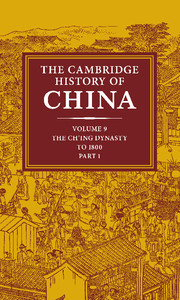Book contents
- Frontmatter
- Introduction: New Order for the Old Order
- 1 State Building before 1644
- 2 The Shun-chih Reign
- 3 The K'ang-hsi Reign
- 4 The Yung-cheng Reign
- 5 The Ch'ien-lung Reign
- 6 The Conquest Elite of the Ch'ing Empire
- 7 The Social Roles of Literati in Early to Mid-Ch'ing
- 8 Women, Families, and Gender Relations
- 9 Social Stability and Social Change
- 10 Economic Developments, 1644–1800
- Bibliography
- Glossary Index
- Map 1. The Ch'ing empire – physical features. John K. Fairbank, ed. Late Ch'ing, 1800–1911, Part 1, Vol. 10 of The Cambridge History of China (New York: Cambridge University Press, 1978), Map 1, p. xii."
- Map 2. Liaotung and vicinity in 1600. Frederic Wakeman, Jr. The great enterprise: The Manchu reconstruction of imperial order in seventeenth-century China (Berkeley, 1985), p. 40. Secondary source: Jonathan D. Spence and John E. Wills, Jr., eds., From Ming to Ch'ing: Conquest, region, and continuity in seventeenth-century China (New Haven, 1979), p. [2]."
- Map 5. Suppression of the “Three Feudatories.” Partly based on: Wang Ya-hsüan, Chungkuo ku-tai li-shih ti-t'u chi (Shenyang: Liao-ning chiao-yü, 1990) p. 163."
- Map 8. Ch'ing empire in 1759. Jacques Gernet. A History of Chinese Civilization (New York: Cambridge University Press, 1982), Map 24, p. 476."
- Map 11. Distribution of Ming and Ch’ing Customs Houses Defining the Ch’ing Empire’s Integrated Market Economy (by the eighteenth century). Based in part on Map 2-1 in Fan I–chun, “Long-distance trade and Market integration in the Ming–Ch’ing Period 1400–1850.” Diss. Stanford University, 1992, Photocopy, Ann Arbor Michigan: UMI Dissertation Services, 1996."
- References
4 - The Yung-cheng Reign
Published online by Cambridge University Press: 28 March 2008
- Frontmatter
- Introduction: New Order for the Old Order
- 1 State Building before 1644
- 2 The Shun-chih Reign
- 3 The K'ang-hsi Reign
- 4 The Yung-cheng Reign
- 5 The Ch'ien-lung Reign
- 6 The Conquest Elite of the Ch'ing Empire
- 7 The Social Roles of Literati in Early to Mid-Ch'ing
- 8 Women, Families, and Gender Relations
- 9 Social Stability and Social Change
- 10 Economic Developments, 1644–1800
- Bibliography
- Glossary Index
- Map 1. The Ch'ing empire – physical features. John K. Fairbank, ed. Late Ch'ing, 1800–1911, Part 1, Vol. 10 of The Cambridge History of China (New York: Cambridge University Press, 1978), Map 1, p. xii."
- Map 2. Liaotung and vicinity in 1600. Frederic Wakeman, Jr. The great enterprise: The Manchu reconstruction of imperial order in seventeenth-century China (Berkeley, 1985), p. 40. Secondary source: Jonathan D. Spence and John E. Wills, Jr., eds., From Ming to Ch'ing: Conquest, region, and continuity in seventeenth-century China (New Haven, 1979), p. [2]."
- Map 5. Suppression of the “Three Feudatories.” Partly based on: Wang Ya-hsüan, Chungkuo ku-tai li-shih ti-t'u chi (Shenyang: Liao-ning chiao-yü, 1990) p. 163."
- Map 8. Ch'ing empire in 1759. Jacques Gernet. A History of Chinese Civilization (New York: Cambridge University Press, 1982), Map 24, p. 476."
- Map 11. Distribution of Ming and Ch’ing Customs Houses Defining the Ch’ing Empire’s Integrated Market Economy (by the eighteenth century). Based in part on Map 2-1 in Fan I–chun, “Long-distance trade and Market integration in the Ming–Ch’ing Period 1400–1850.” Diss. Stanford University, 1992, Photocopy, Ann Arbor Michigan: UMI Dissertation Services, 1996."
- References
Summary
Sandwiched between the sixty-year reigns of both his father and his son, the comparatively short rule of the emperor Shih-tsung marked a turning point in Ch'ing statecraft. Between 1723 and 1735, the Ch'ing state launched a program of bureaucratic and fiscal reform that addressed some of the key structural obstacles to the development of a modern state. Public programs were directed at expanding the agricultural base and making local government more responsive to the needs of the rural population. Frontier policy pursued a path that ultimately extended the reach of the Ch'ing state deep into central Asia and Tibet and consolidated control of neglected regions of China itself.
The achievements of these thirteen years owed much to the emperor's own vision, and his commitment to efficient and effective centralized government. However, the innovation and activism of the Yung-cheng reign were not always welcome, particularly when they challenged the power and privilege of the degree-holding elites. In addition, government policy during these thirteen years was played out against the background of the succession crisis of the 1710s and 1720s. The emperor who ruled under the reign title Yung-cheng was accused of usurpation and patricide during his lifetime. Upon his death, rumors circulated that he was the victim of an assassin's hand. For a time, controversy over the emperor's personal behavior threatened the reconciliation of Manchu and Chinese that had been one of the greatest achievements of the K'ang-hsi period. While questions of his legitimacy followed the Yung-cheng emperor to his grave, his enduring legacy was an approach to statecraft that strengthened both the objectives and the capacities of the late imperial state.
Keywords
- Type
- Chapter
- Information
- The Cambridge History of China , pp. 183 - 229Publisher: Cambridge University PressPrint publication year: 2002
References
- 5
- Cited by

